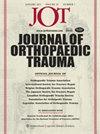Ankle Fractures Treated with Locked Fibular Intramedullary Nailing: Description and Outcomes of a Minimally Invasive Open Technique.
IF 1.6
3区 医学
Q3 ORTHOPEDICS
引用次数: 0
Abstract
OBJECTIVES To describe and report outcomes of a minimally invasive open intramedullary (IM) fibular nailing technique for fixation of ankle fractures. METHODS Design: Case Series. SETTING Urban Level 1 trauma center. PATIENT SELECTION CRITERIA Adult patients with ankle fractures (OTA 44A-C) treated with locked fibular IM nailing via a minimally invasive open technique for fracture and syndesmotic reduction between 2021 and 2024.Outcome Measures and Comparisons: Quality of reduction, complications, and patient-reported outcomes (PRO). RESULTS A total of 150 consecutive patients operated by a single surgeon were included. Mean age was 53.3 (17-97) years, and mean BMI was 30.6 ± 7.4 kg/m2. 93(62%) patients were female, and 78 (52%) patients were Caucasian. 72 (48%) patients were obese, 40 (27.7%) patients were current/former smokers, 39 (26%) patients were diabetic, and 23 (15.3%) patients had open fractures. 37 (24.7%) patients had isolated lateral malleolus fractures, 48 (32%) had bimalleolar fractures, and 65(43.3%) had trimalleolar fractures. 123 (82%) patients had 2 syndesmotic screws placed, 26 (17.3%) had 1 screw, and 1 (0.7%) had none.Quality of reduction was good for 98%, fair for 2%, and poor for none per McLennan's criteria. 113 patients (75.3%) were followed until clinical and radiographic union for a mean of 7.6 months (range 3-22) months). 110 patients (97.3%) went on to successful clinical and radiographic union following the index procedure. No patient had a superficial surgical-site infection, and 3 (2.6%) had deep surgical-site infections. 3 patients had a loss of reduction, and 6 patients had implant failure (5 broken syndesmotic screws, and 1 medial malleolus screw). 9 (8%) patients had unplanned reoperations (3 for debridement, 2 for loss of reduction, and 4 for removal of symptomatic implants).Mean ankle range of motion at final follow-up visit was 12.9° (0-40) of dorsiflexion, 39.6° (10-70) of plantarflexion, 23.5° (5-40) of inversion, and 18.2° (5-50) of eversion. Mean PROs at final follow-up visit were: Global Physical Health: 42.4 (23.5-67.6), Global Mental Health: 47.5 (21-67.6), Physical Function: 37.5 (14.7-57.8), Pain: 54.9 (22-72) and Mobility: 36.9 (16-65.3). CONCLUSIONS Minimally invasive open fibular IM nailing allowed for excellent reduction and results in union with low rates of complications and good patient reported outcomes. LEVEL OF EVIDENCE Therapeutic Level IV. See Instructions for Authors for a complete description of levels of evidence.用锁定腓骨髓内钉治疗踝关节骨折:微创开放技术的描述与疗效。
目的描述并报告微创开放式髓内(IM)腓骨钉技术固定踝关节骨折的结果:患者选择标准2021年至2024年期间,踝关节骨折(OTA 44A-C)的成人患者通过微创开放式腓骨髓内钉锁定技术进行骨折和韧带复位治疗:结果共纳入 150 名连续患者,由一名外科医生进行手术。平均年龄为 53.3 (17-97)岁,平均体重指数为 30.6 ± 7.4 kg/m2。93名(62%)患者为女性,78名(52%)患者为白种人。72(48%)名患者肥胖,40(27.7%)名患者目前/曾经吸烟,39(26%)名患者患有糖尿病,23(15.3%)名患者有开放性骨折。37(24.7%)名患者有孤立的外侧踝骨骨折,48(32%)名患者有双踝骨折,65(43.3%)名患者有三踝骨折。根据麦克伦南的标准,123 名患者(82%)植入了 2 颗巩膜螺钉,26 名患者(17.3%)植入了 1 颗螺钉,1 名患者(0.7%)未植入任何螺钉。113 名患者(75.3%)接受了平均 7.6 个月(3-22 个月)的临床和放射学联合随访。)110名患者(97.3%)在接受指数手术后成功实现了临床和影像学结合。没有患者发生浅表手术部位感染,3 例(2.6%)发生深部手术部位感染。3名患者的腓骨缩窄度下降,6名患者的植入失败(5枚腓骨联合螺钉断裂,1枚内侧腓骨螺钉断裂)。最后随访时的平均踝关节活动范围为:外翻 12.9°(0-40),跖屈 39.6°(10-70),内翻 23.5°(5-40),外翻 18.2°(5-50)。最后一次随访时的PRO平均值为总体身体健康:42.4(23.5-67.6),总体心理健康:47.5(21-67.6),身体功能:结论微创开放式腓骨IM钉可获得极佳的缩复效果和结合效果,并发症发生率低,患者报告结果良好。有关证据等级的完整描述,请参阅 "作者须知"。
本文章由计算机程序翻译,如有差异,请以英文原文为准。
求助全文
约1分钟内获得全文
求助全文
来源期刊

Journal of Orthopaedic Trauma
医学-运动科学
CiteScore
3.90
自引率
8.70%
发文量
396
审稿时长
3-8 weeks
期刊介绍:
Journal of Orthopaedic Trauma is devoted exclusively to the diagnosis and management of hard and soft tissue trauma, including injuries to bone, muscle, ligament, and tendons, as well as spinal cord injuries. Under the guidance of a distinguished international board of editors, the journal provides the most current information on diagnostic techniques, new and improved surgical instruments and procedures, surgical implants and prosthetic devices, bioplastics and biometals; and physical therapy and rehabilitation.
 求助内容:
求助内容: 应助结果提醒方式:
应助结果提醒方式:


